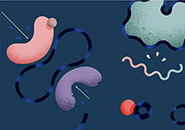Every living being needs to rest. Even our immune cells enter a dysfunctional state called T cell exhaustion if they’re overworked. In fact, this fatigue and the ensuing downtime are important parts of the immune process.
Killer T cells get their name from their function. They target sickened cells involved in chronic infections, killing them before the viruses inside can replicate and spread. But chronic infections can be lengthy, and after a few weeks of sustained action, cellular exhaustion often sets in. The T cells become less effective at slaying their targets and begin producing proteins that prevent them from recognizing infected cells.
One of these proteins is called programmed cell death protein 1, or PD-1. Susan Kaech, an HHMI early career scientist at Yale University, discovered a feedback loop by which PD-1 activation leads to an increase in a protein called FOXO1. FOXO1, in turn, produces factors that promote T cell exhaustion, including more PD-1. Kaech suspected that eliminating FOXO1 might curtail T cells’ exhaustion and make them better killers.
What she found was the exact opposite. When her team created mice lacking the FOXO1 gene, the rodents’ T cells did produce less PD-1 compared to animals with the gene. But the cells weren’t better at controlling the viral infection. Instead, without the rest afforded them in their exhausted state, the cells died, and viral replication increased.
Kaech concluded that T cells need this respite to function properly. “They have to turn down their response or else they’ll get over-activated, and we think that causes the cells to deteriorate and die,” she says. “We’re starting to appreciate that exhaustion is an important process that is helping to maintain this precious pool of T cells.”
The findings, published November 20, 2014, in Immunity, could lead to drugs that modulate FOXO1 and help reinvigorate the immune response of patients being treated for chronic viral infections or even cancer. “There may be a point where you can stop the cells from fully entering the exhausted state – where you suppress PD-1, but not so much that the cells die,” Kaech says.








